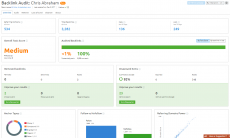Well, this sucks. Google recently dropped the local carousel for hotels, restaurants, and a number of other local listings. Now, it’s great news for Google—and what haven’t they done lately that’s good for Google—but it’s not so great for you. Because this change means that all the listings above the fold—fully 100% of the information users see without scrolling—are paid listings.
That’s right. Google, the search engine for most of the world provides absolutely zero organic listings to users on the first page. As Mike Blumenthals recently, and accurately, stated “Perhaps it is time that we begin to think of Google as an ad engine that also returns some search results.”
What does this mean for your business? Should we grab the pitchforks and torches to storm Google’s castle, demanding they change it back? And how can you respond to this change?
Read on, friends, read on.
This Isn’t News
First off, let’s remember that this isn’t news. Google’s been moving in this direction for quite a while, reducing the information offered within organic search, providing less information about organic search activity to marketers, and, with Google Shopping, moving to paid inclusion as the norm over two years ago… despite once calling the practice “evil.” So, there’s that.
I mentioned this move in a talk to an industry group at the time along with the warning that we’ve got to stop training our customers to keep shopping for a better deal. Call Google’s actions evil if you want. But when you sign distribution or affiliate marketing agreements with retailers and wholesalers determined to offer the lowest price to consumers, you’re empowering Google to increase tolls on the roads it controls. This wasn’t news two years ago. It shouldn’t be news today. It shouldn’t surprise you whenever Google decides to impose further tolls in the future.
Expect More Changes to Come
Which brings us to point #2: this is far from over. Google only introduced Carousel a little over a year ago, just one in a long line of tests and experiments affecting search experience. We don’t know if Google’s going to stick with this change, if Carousel will return, or if they’ll introduce some altogether different local search experience designed to increase clicks, revenues, conversion rate, or all of the above. You don’t have to love this change (and I can’t imagine why anyone would). But much like the weather in Texas, this too will change.
Plan Ahead
Finally, this seems like a good opportunity to plan for a world without Google. Seriously. While it’s unlikely you can cut ties with the search giant completely, it’s clear you can’t rely on Google to consistently act in your best interests. So why not look for ways to reduce your Big G dependency? Here are a few tips to help:
- Segment your best customers. Determine the channels driving traffic and revenues to your business. Work on developing effective attribution models. Then work on a) increasing the volume of traffic from your best channels, and b) increasing the value of traffic from under-performing channels.
- Keep on building your mailing list. Email is far from dead. Use it to your advantage. Make this your mantra in 2015: “Grow your list. Grow your profits.”
- Continue creating useful content for your customers. Great content will attract eyeballs, links, “Likes,” and “Shares” from search, social, and plain ol’ word-of-mouth, just as it always has. It works because it helps your customers solve their problems. Focus in particular on those content pieces that both help your customers and help your bottom line. Look for ways to repurpose that content in new channels (can you take your existing material and compile it into an ebook or white papers? Develop a blog post listing your top content from the past year? Include it in your email newsletter? Share it on social channels? And on and on and on?) Make your content work for you, not just as link-bait for search engines, but also as a resource for customers in all channels. Then maybe you won’t need to rely on link-bait in the first place.
Conclusion
Yes, it really does suck that Google is getting rid of Carousel for local search. It’s a real drag that all the main links on local search results require pay-to-play. Bummer. You can complain about it all you want. But while you’re griping to your buddies and business partners, you can also do something about it. Start thinking about how to reduce your reliance on Google for your business results. Start looking at other ways to grow your traffic and your conversions. And start helping your customers find you in other ways.
Do you want to learn more about how to improve sales, increase conversions, and reduce the costs from your search marketing? Then take a moment to check out our Biznology Jumpstart Workshop: On-site Search Marketing Training. Taught by three Biznology search marketing experts, you’ll learn how to make your search marketing work for your business. Interested in learning more? Check it out.






